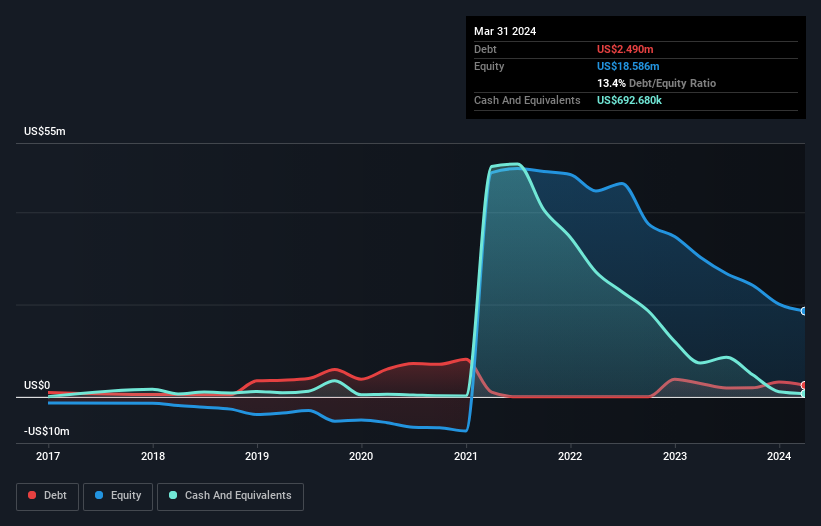
Some say volatility, rather than debt, is the best way to think about risk as an investor, but Warren Buffett famously said that 'Volatility is far from synonymous with risk.' It's only natural to consider a company's balance sheet when you examine how risky it is, since debt is often involved when a business collapses. Importantly, urban-gro, Inc. (NASDAQ:UGRO) does carry debt. But the more important question is: how much risk is that debt creating?
Why Does Debt Bring Risk?
Debt and other liabilities become risky for a business when it cannot easily fulfill those obligations, either with free cash flow or by raising capital at an attractive price. In the worst case scenario, a company can go bankrupt if it cannot pay its creditors. However, a more common (but still painful) scenario is that it has to raise new equity capital at a low price, thus permanently diluting shareholders. Of course, plenty of companies use debt to fund growth, without any negative consequences. When we examine debt levels, we first consider both cash and debt levels, together.
See our latest analysis for urban-gro
How Much Debt Does urban-gro Carry?
The image below, which you can click on for greater detail, shows that urban-gro had debt of US$2.49m at the end of March 2024, a reduction from US$2.91m over a year. However, because it has a cash reserve of US$692.7k, its net debt is less, at about US$1.80m.

A Look At urban-gro's Liabilities
According to the last reported balance sheet, urban-gro had liabilities of US$35.5m due within 12 months, and liabilities of US$2.06m due beyond 12 months. On the other hand, it had cash of US$692.7k and US$28.9m worth of receivables due within a year. So it has liabilities totalling US$7.92m more than its cash and near-term receivables, combined.
This deficit isn't so bad because urban-gro is worth US$15.3m, and thus could probably raise enough capital to shore up its balance sheet, if the need arose. But it's clear that we should definitely closely examine whether it can manage its debt without dilution. There's no doubt that we learn most about debt from the balance sheet. But ultimately the future profitability of the business will decide if urban-gro can strengthen its balance sheet over time. So if you want to see what the professionals think, you might find this free report on analyst profit forecasts to be interesting.
Over 12 months, urban-gro reported revenue of US$70m, which is a gain of 12%, although it did not report any earnings before interest and tax. That rate of growth is a bit slow for our taste, but it takes all types to make a world.
Caveat Emptor
Over the last twelve months urban-gro produced an earnings before interest and tax (EBIT) loss. Its EBIT loss was a whopping US$14m. Considering that alongside the liabilities mentioned above does not give us much confidence that company should be using so much debt. Quite frankly we think the balance sheet is far from match-fit, although it could be improved with time. However, it doesn't help that it burned through US$7.1m of cash over the last year. So suffice it to say we consider the stock very risky. When analysing debt levels, the balance sheet is the obvious place to start. However, not all investment risk resides within the balance sheet - far from it. For example, we've discovered 5 warning signs for urban-gro (1 can't be ignored!) that you should be aware of before investing here.
If, after all that, you're more interested in a fast growing company with a rock-solid balance sheet, then check out our list of net cash growth stocks without delay.
Valuation is complex, but we're here to simplify it.
Discover if urban-gro might be undervalued or overvalued with our detailed analysis, featuring fair value estimates, potential risks, dividends, insider trades, and its financial condition.
Access Free AnalysisHave feedback on this article? Concerned about the content? Get in touch with us directly. Alternatively, email editorial-team (at) simplywallst.com.
This article by Simply Wall St is general in nature. We provide commentary based on historical data and analyst forecasts only using an unbiased methodology and our articles are not intended to be financial advice. It does not constitute a recommendation to buy or sell any stock, and does not take account of your objectives, or your financial situation. We aim to bring you long-term focused analysis driven by fundamental data. Note that our analysis may not factor in the latest price-sensitive company announcements or qualitative material. Simply Wall St has no position in any stocks mentioned.
Have feedback on this article? Concerned about the content? Get in touch with us directly. Alternatively, email editorial-team@simplywallst.com
About NasdaqCM:UGRO
urban-gro
Engages in the designing, engineering, building, and integrating complex environmental equipment systems for indoor controlled environment agriculture (CEA) cultivation and retail facilities in the United States, Canada, and Europe.
Very undervalued with mediocre balance sheet.
Market Insights
Community Narratives



